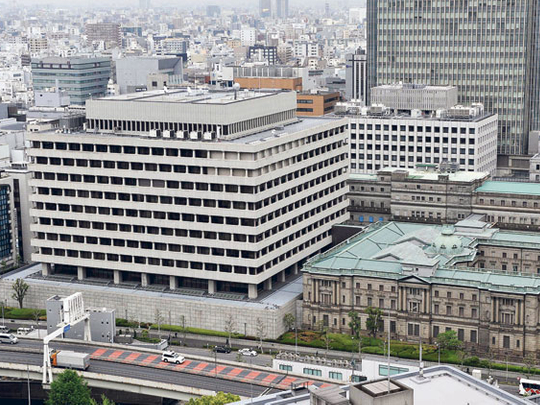
Tokyo : Japanese bank lending fell in April from a year earlier, matching the biggest decline in four years and showing that companies' funding needs remain weak despite an economic recovery and recent easing steps by the central bank.
To stimulate more spending in new business areas, the Bank of Japan (BoJ) said last month it would consider new ways to bolster growth and many analysts expect a new facility aimed at banks that make loans to areas with growth potential.
But they also believe such a scheme is unlikely to pull Japan out of its current liquidity trap, with companies and consumers so pessimistic about the economic outlook that no amount of cheap funding coaxes them to borrow.
"Nominal economic growth is still low so there's not much corporate demand for funds," said Takeshi Minami, chief economist at Norinchukin Research Institute in Tokyo.
Loan programme
"I don't think the new loan programme being examined by the Bank of Japan will help much. It's capital markets, not banks, that are good at funnelling money efficiently to companies with growth potential. The Bank of Japan has no role to play here."
Outstanding loans held by Japanese banks fell 1.8 per cent in the year to April, matching the annual decline in March, which was the biggest fall in four years.
Strong exports to Asia and government stimulus have helped the Japanese economy recover since the second quarter of last year but many economists think the recovery will remain slow and vulnerable to shocks such as the European debt crisis.
Companies are still cautious about increasing spending. They are also holding plenty of cash after borrowing more than they needed to last year when they were worried about the credit crunch, reducing the need to borrow.
Deflation is also seen persisting for at least another year. That could hamper borrowing as deflation makes the real cost of borrowing higher than nominal interest rates.
Interest rates
The BoJ, which has kept interest rates at 0.10 per cent since late 2008, has eased policy twice in recent months by offering cheap funds to banks. The bank will hold its next policy meeting on May 20-21.
Underscoring the nascent economic recovery and the lack of corporate need for loans was a 13.2 per cent decline in Japanese corporate bankruptcies for April from a year earlier to 1,154 cases. Total debt involved plunged 48 per cent to 270 billion yen ($2.9 billion), the lowest since August 1975.
Japan's service sector sentiment index, seen as a good leading indicator on the economy, also rose to a three-year high.
Other data showed Japan's current account surplus rose 65 per cent in March from a year earlier to its biggest amount in two years, as exports steadily pick up thanks to brisk demand, particularly from Asia.
The surplus stood at 2.5 trillion yen, above a median forecast for 2.1 trillion yen, and marking the biggest gain since March 2008 when it reached 2.9 trillion yen.
The hefty surplus is also a reflection of huge savings within the Japanese economy.












